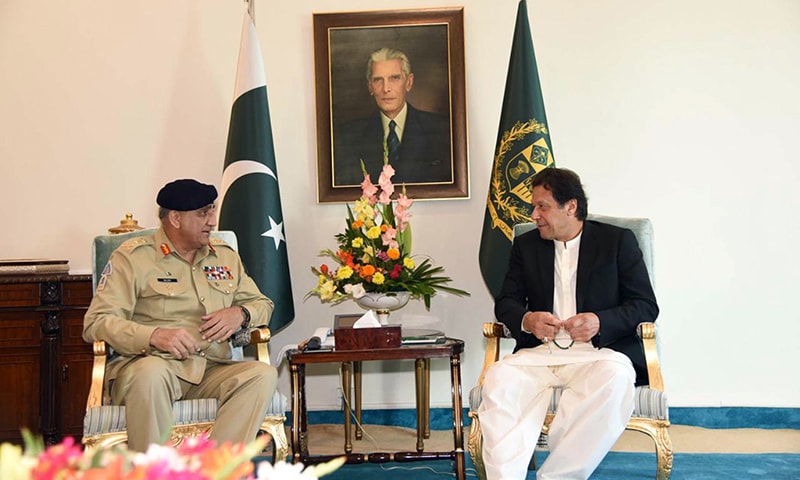
Chief of Army Staff General Qamar Javed Bajwa meets Prime Minister Imran Khan at PM House — PID
by Rajesh Kumar Sinha 30 January 2022
The selected Prime Minister of Pakistan Imran Khan very recently, brought his nation into global headlines, once again, for all the wrong reasons. Talking to the citizens over national television, he virtually threatened almost one and everybody, the army, the opposition politicians, citizens, that whoever dared to compel him to leave his position, he would become even more dangerous and take to the streets.
Coming such words from a sitting Prime Minister of a country, sounds bizarre but certainly not unexpected from a tumultuous nation like Pakistan. In the 74 years of its existence, the country has been under direct or indirect military rule for a significant period of time. Even the current civilian rule, is regarded as a propped-up one by the Pakistan Army who used the so-called democratic elections to put up Imran Khan, at the helm, to pursue its own agenda.
Since coming to power in August, 2018 Imran Khan had to concede to army’s demands regularly and frequently. However, two instances where it came into the limelight were when the government was forced to grant, what many saw as illegal, three years’ extension to the serving army chief General Qamar Jawed Bajwa, using the non-existent national security alibi, and second when, the appointment of Director General (DG) to the second most powerful institution in the country, the Inter-Services Intelligence (ISI), became a flashpoint between Imran Khan and the Pakistan Army Chief.
It is common knowledge in Pakistan, though seldom spoken publicly, that the current Prime Minister of Pakistan Imran Khan, has been appointed by the current army chief to further interests of the army and as such he is expected to merely listen to the dictates from Rawalpindi, the Pakistan Army Headquarters and fulfil their demands, as and when asked for. Any deviation from that will not be treated with kid gloves and reaction could always be swift and dramatic, as has been evident in the history of the country.
Some of the reasons attributed to the choice of Imran Khan as PM by the Pakistan army, lie in his popularity as a former cricketer and his western background that many believed would be helpful in improving country’s relations with the US and Europe. However, contrary to expectations, the ascension of Imran Khan has not only led to a huge deterioration in relations with Europe and the US but the traditional, brotherly relationship with the middle east, especially with Saudi Arabia and the United Arab Emirates (UAE) has affected the entire economic and diplomatic strategy of Pakistan.
Politically too, Pakistan remains a troubled, politically unstable nation. Political rallies, demonstrations, violent clashes, killing of foreigners, threat and coercion of journalists, intimidation of minorities are a norm in the country. The Imran Khan establishment has witnessed an increase in socio-political violence in the last few years and there has been a complete failure of the government to contain such clashes. Frequent demonstrations by the opposition politicians from PML, PPP, Fazal-Ur-Rehman’s PDM has hit the common life while violent demonstrations by Pakistan Tehreek-e-Labbaik (TLP) against France created a big diplomatic crisis. Tehreek-i-Taliban Pakistan (TTP) is another violent Pashtun Islamist group that has regularly been fighting and killing Pakistani army (a few days back it killed 14 Pakistani soldiers) and security forces personnel. Punjab, Baluchistan and Khyber Pakhtunkhwa, all major regions of the country have become more violent and seen incessant conflict since Imran Khan becoming the PM of the country.
Economically, the country is witnessing the worst since independence. A GDP growth of about 3.5%, inflation hovering around 9% and forex reserves at an abysmal low of US$ 14Billion, the cash-strapped country has been forced to accept a humiliating IMF conditionality of giving autonomy to the central bank State Bank of Pakistan (SBP). It was forced to collect US$ 1Billion from international markets through an Islamic Bond with an incredible 7.95% interest rate. Its current account deficit at US$ 1.93Billion, stands at about 7.6% of the GDP. The prices of daily necessities, electricity, petrol are at a very high, gas shortage is affecting whatever little industrial production Pakistan boasts of and common people and economists are extremely wary of the grim economic scenario of the country.
In the midst of such a difficult situation, Pakistan’s bilateral relations with its closest neighbours India and Afghanistan, are on a continuous downslide. While Imran Khan with his irresponsible rhetoric and utterances against Indian PM Modi has further vitiated the atmospherics, on Afghanistan in spite of carefully manufactured optics, the government has failed to explain the constant bickering and conflict with a supposedly friendly and pliable Taliban government there.
With Pakistan PM Imran Khan publicly declaring his frustration in not receiving a telephone call from the US President Joe Biden, and going beyond the usual self in appeasing the Chinese, Pakistan finds itself in an awkward, isolated position globally. The FATF Grey List still a reality and terrorism even preventing foreign players to visit the country for Cricket (New Zealand and England cancelling their scheduled visits, the only sport that the country is known for), the tumultuous journey of this south Asian nation Pakistan continues, gripped with uncertainties and fear.
